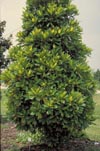Home >
Magnolia grandiflora 'Plantation', Plantation Magnolia
Nice cultivar resembling 'Select II' or Greenback™. Southern Magnolia will thrive in a moist organic soil in full sun and hot conditions once established. Southern Magnolia prefers acid soil but will tolerate a slightly basic, even wet or clay soil. Select seedlings grown from trees in alkaline soil for planting in this high pH soils.
Species occurs throughout north and central Florida south to Desoto County.
The root system is wider spreading than most other trees, extending from the trunk a distance equal to about 4 times the canopy width. This makes it very difficult to save existing Magnolia trees on construction sites, and makes transplanted trees recover slowly. Some nursery growers overcome this by regular root pruning programs and/or digging from a field nursery in mid-summer - this appears to help them recover quicker than those transplanted in the dormant season. Dormant season dug trees that are not root pruned often loose some to many interior leaves and canopies look quite thin for a period of months or a year or two. Field grown trees transplant best if root pruned regularly during the production period.
Tolerance
to wet soils appears to be seed source dependent. Some trees die when
exposed to sudden wet soil conditions following a heavy rain, others pull
through with little apparent damage. I have also seen plants growing well
on sandy dunes near the beach. Cultivars could be selected for tolerance
to wet soil and drought. Trees tend to have a low failure rate meaning
that branches break from these trees less often than from some other trees.
This plant is considered mostly allergy free and causes little or no allergy
problems in most people.


